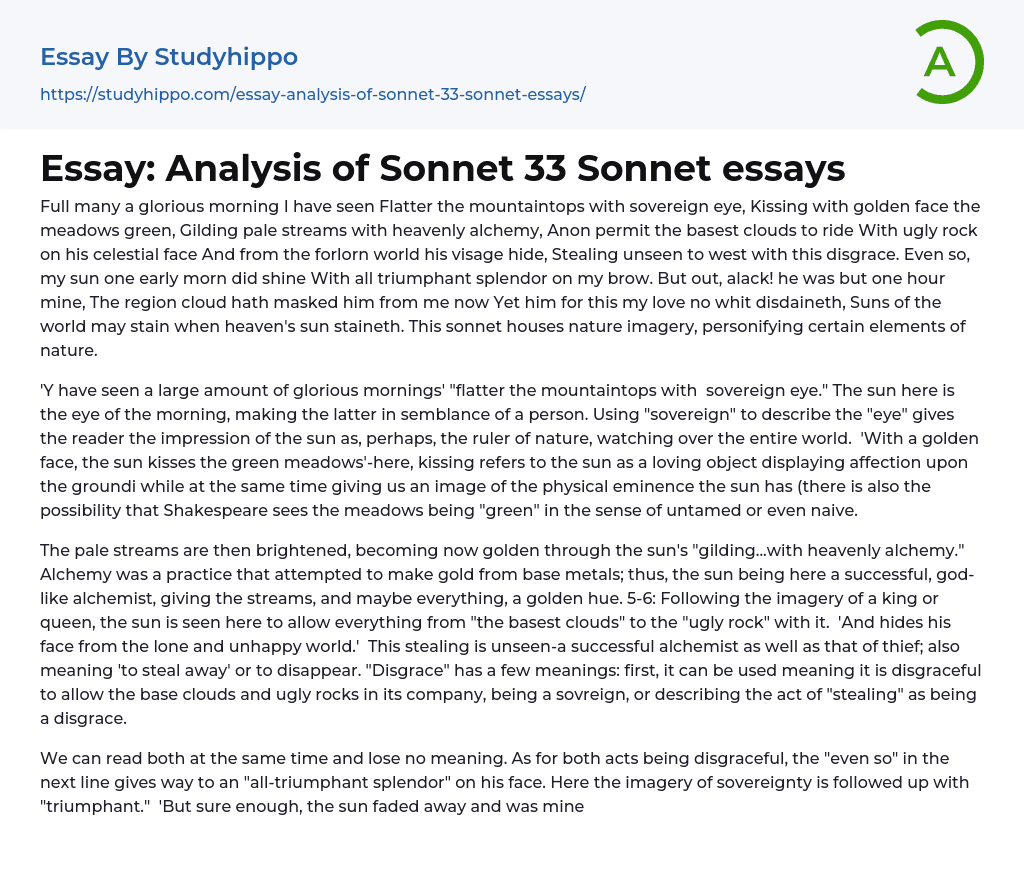Full many a glorious morning I have seen Flatter the mountaintops with sovereign eye, Kissing with golden face the meadows green, Gilding pale streams with heavenly alchemy, Anon permit the basest clouds to ride With ugly rock on his celestial face And from the forlorn world his visage hide, Stealing unseen to west with this disgrace. Even so, my sun one early morn did shine With all triumphant splendor on my brow. But out, alack! he was but one hour mine, The region cloud hath masked him from me now Yet him for this my love no whit disdaineth, Suns of the world may stain when heaven's sun staineth. This sonnet houses nature imagery, personifying certain elements of nature.
'Y have seen a large amount of glorious mornings' "flatter the mountaintops with sovereign eye." The sun here is the eye of the
...morning, making the latter in semblance of a person. Using "sovereign" to describe the "eye" gives the reader the impression of the sun as, perhaps, the ruler of nature, watching over the entire world. 'With a golden face, the sun kisses the green meadows'-here, kissing refers to the sun as a loving object displaying affection upon the groundi while at the same time giving us an image of the physical eminence the sun has (there is also the possibility that Shakespeare sees the meadows being "green" in the sense of untamed or even naive.
The pale streams are then brightened, becoming now golden through the sun's "gilding...with heavenly alchemy." Alchemy was a practice that attempted to make gold from base metals; thus, the sun being here a successful, god-like alchemist, giving the streams, and maybe
everything, a golden hue. 5-6: Following the imagery of a king or queen, the sun is seen here to allow everything from "the basest clouds" to the "ugly rock" with it. 'And hides his face from the lone and unhappy world.' This stealing is unseen-a successful alchemist as well as that of thief; also meaning 'to steal away' or to disappear. "Disgrace" has a few meanings: first, it can be used meaning it is disgraceful to allow the base clouds and ugly rocks in its company, being a sovreign, or describing the act of "stealing" as being a disgrace.
We can read both at the same time and lose no meaning. As for both acts being disgraceful, the "even so" in the next line gives way to an "all-triumphant splendor" on his face. Here the imagery of sovereignty is followed up with "triumphant." 'But sure enough, the sun faded away and was mine for only one hour,' and the cloud in that area of the poet masked the sun's visage from his sight (and also taking away some of the holdings of the sovereign). 'Yet my love being both his emotional love and also his lover, at no amount here is a possible double negative, seeing that "whit" means 'not any amount', dislikes the sun because it is not worthy enough, "suns" also means 'children', which is perfectly acceptable considering this group of sonnets appears after the procreation sonnets; therefore, the brightness and beautiful presence of children may not always be seen , just as the light of the sun sun is occasionally clouded over.
- American Literature essays
- Between The World and Me essays
- Book Report essays
- Book Review essays
- Book Summary essays
- Books essays
- Character essays
- Coming of Age essays
- Dante's Inferno essays
- Everyday Use essays
- Flowers for Algernon essays
- Genre essays
- Greek Mythology essays
- Incidents in The Life of a Slave Girl essays
- Letter essays
- Literary Criticism essays
- Literary devices essays
- Literature Review essays
- Metaphor essays
- Myth essays
- Play essays
- Plot essays
- Poem essays
- Poetry Analysis essays
- Protagonist essays
- Reader essays
- Reason essays
- Rhetoric essays
- Rhetorical Question essays
- Rhyme essays
- Simile essays
- Tragic Hero essays
- Translation essays
- Understanding essays
- Utopia essays
- Villain essays
- Writer essays
- John Locke essays
- 9/11 essays
- A Good Teacher essays
- A Healthy Diet essays
- A Modest Proposal essays
- A&P essays
- Academic Achievement essays
- Achievement essays
- Achieving goals essays
- Admission essays
- Advantages And Disadvantages Of Internet essays
- Alcoholic drinks essays
- Ammonia essays




